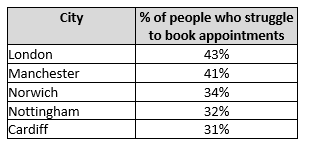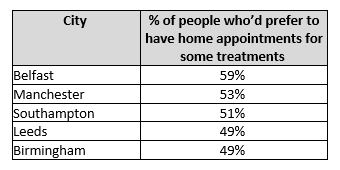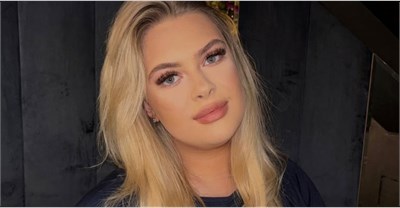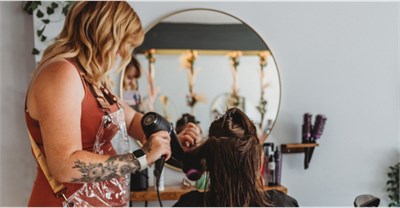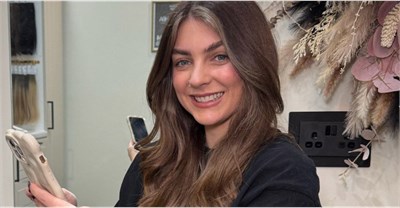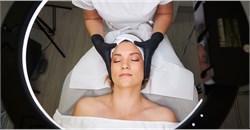Menu
The Cost of Going Freelance, Mobile, or Independent
According to a new report from the National Hair & Beauty Federation (NHFB), the hair and beauty sector was one of the hardest hit due to closures during the pandemic, with turnover falling by 45% YOY in 2020¹. Now, with many hair and beauty salons still playing catch up with appointments following these closures, almost a third of UK consumers admit they are struggling to get a salon appointment that fits around their schedule.
According to data from the NHBF, there were upwards of 43,000 hair and beauty businesses in the UK alone in 2019², which equates to one salon per 1,589 people³, which makes the current appointment issue perfectly understandable.
Whilst there are many excellent barber shops, and hairdressing and beauty salons dotted across the country, all working hard to help Brits look and feel their best, we wanted to explore the options available for those considering the freelance route, especially with the festive season fast approaching.
So, what are the most in demand treatments we’re struggling to get booked in, what are the costs and considerations associated with those going it alone? Essentially, where do the best opportunities lie for those considering going freelance in 2021 and beyond?
We surveyed 2,000 UK adults to find out more.
In Demand Treatments and Services
With hair appointments often taking place regularly - every 6-8 weeks for those looking to maintain a certain hairstyle – it’s easy to see why demand is so high.
Other in-demand services where appointments were harder to come by of late, included a wash, cut and blow-dry; gents’ haircut; highlights; and a full head of colour.
Top hair and beauty treatments Brits are struggling to get a salon appointment for right now:
1. Haircut (wet and dry cut)
2. Wash, cut and blow-dry 3. Gents cut
4. Highlights
5. Full head colour
6. Colour correction
7. Hair up
8. Scalp treatment
9. Blow dry
10. Full Body Massage
The UK capital, London, was found to have the greatest shortfall of appointments, as 43% of those surveyed told us they often struggle to get booked in, whilst four in ten Mancunions (40%) also cannot get an appointment, making it the second hardest place to book salon services and treatments right now.
There’s No Place Like Home
With salon bookings proving more difficult to come by - and a party-packed festive season likely to only exacerbate this issue over the coming months - we asked UK consumers about how they’d feel about using a freelance or independent professional instead of heading to their salon.
Our survey revealed that the majority (51%) of those polled would prefer to have at least some of their hair and beauty treatments take place in their own home, with almost half (46%) even happy to pay more for the services of a mobile or freelance hairdresser.
Four in ten (40%) of those surveyed also said they would be happy to pay a fifth (20%) more than the usual cost of their in-salon treatments and services in order to secure an out of hours (evening or Sunday appointment) with a mobile hair or beauty professional at their home.
Top hair and beauty treatments Brits would prefer to have done at home
1. Haircut (wet and dry)
2. Wash, cut and blow-dry
3. Gents cut
4. Full head colour
5. Blow dry
6. Full Body Massage
7. Highlights
8. Hair up
9. Root colour
10. Intimate Waxing
Despite London claiming top spot on the list of locations where certain appointments are proving hard to come by right now, residents in the Northern Ireland city of Belfast were actually revealed to be those most eager (59%) to switch to a freelance, independent, or mobile hairdresser instead. Consumers living in both Manchester (53%) and Southampton (51%) were also keen to do so.
The Benefits of Going Freelance
Demand around appointments aside, there are of course many wider benefits and reasons behind why people may consider going down the route of freelance, independent, or mobile within the hair and beauty industry.
Whilst for some, a salon environment provides a level of security they’d rather not forgo, there are some obvious longer-term benefits around freelancing that are a big draw for those considering following that career path, with flexible working hours perhaps being one of the most attractive aspects of doing so.
With so many of us leading busy home lives, the flexibility of going freelance can mean working life can slot in around our day-to-day schedule, be it caring for a loved one, the many responsibilities that come with being a parent, studying alongside our current job, or even juggling a second job, which is may not be possible when working as part of a larger team, or when working to set salon times.
And the prospect of flexibility isn’t reserved solely for busy schedules, being able to offer something a little more creative or niche can also be a big bonus in terms of a freelance, mobile or independent career path, as is being able to manage your own client base too.
Understandably, there may also be some pros when it comes to thinking about the financial side of freelance work. There are set up costs associated with both freelance and salon work, but when working for yourself, being able to make manage and make decisions around the incomings and outgoings of your business offers a level of control that may be appealing to some, as well as not having to give a cut of your earnings to cover the cost of renting a chair, or similar. But, what are other costs you have to consider?
If you’re thinking about ‘going freelance’ then you'll need to be aware of some of the start-up costs that you’re likely to encounter.
Demand around appointments aside, there are of course many wider benefits and reasons behind why people may consider going down the route of freelance, independent, or mobile within the hair and beauty industry.
Whilst for some, a salon environment provides a level of security they’d rather not forgo, there are some obvious longer-term benefits around freelancing that are a big draw for those considering following that career path, with flexible working hours perhaps being one of the most attractive aspects of doing so.
And the prospect of flexibility isn’t reserved solely for busy schedules, being able to offer something a little more creative or niche can also be a big bonus in terms of a freelance, mobile or independent career path, as is being able to manage your own client base too.
Understandably, there may also be some pros when it comes to thinking about the financial side of freelance work. There are set up costs associated with both freelance and salon work, but when working for yourself, being able to make manage and make decisions around the incomings and outgoings of your business offers a level of control that may be appealing to some, as well as not having to give a cut of your earnings to cover the cost of renting a chair, or similar. But, what are other costs you have to consider?
With salons still playing catch up on bookings following the multiple covid-closures, our research found that in-salon haircuts (both wet and dry) are proving the hardest to book in, with one in seven (15%) reporting a shortfall in suitable appointments.
The Cost of Going FreelanceIf you’re thinking about ‘going freelance’ then you'll need to be aware of some of the start-up costs that you’re likely to encounter.

Equipment
As you will be running your business costs can quickly add up, the average cost of styling and heat tools for a hairdresser comes in at around £1,850. This is not including hair toners, dyes, bleaches, or shampoos that you will have to keep stocked up for multiple hair transformations.
Insurance & Licenses
Other elements to consider are insurance and licences. It’s important to make sure you have all the correct licenses and registrations in place - you can check what you need with your local council if you’re unsure. You’d be likely to have Public Liability Insurance, as you’ll be working with clients. The average cost of this insurance is £118 but can be as little as £50 if you are a small business. ⁴
Travel Expenses
If you’re deciding to be a mobile hairdresser and go to your client’s homes, it’s important to factor in your travel expenses. Make sure you keep your receipts for tax purposes! Also, consider how far you’d be willing to travel for your appointments as you need to also plan in any travel time to your day, and possibly into your prices.
Utilities
For those running their freelance business from their home, you’ll need to consider how this will affect your monthly bills. Using extra electricity and water each month will bump up your bills, and so you may want to think about where you can save money. Small changes such as using tepid rather than hot water or investing in an eco-friendly showerhead could help. Dr Denise Baden from Southampton Business School suggests that reducing the use of hot water and shampooing once instead of twice can save 71,500 litres of water a year. ⁵
As you will be running your business costs can quickly add up, the average cost of styling and heat tools for a hairdresser comes in at around £1,850. This is not including hair toners, dyes, bleaches, or shampoos that you will have to keep stocked up for multiple hair transformations.
Insurance & Licenses
Other elements to consider are insurance and licences. It’s important to make sure you have all the correct licenses and registrations in place - you can check what you need with your local council if you’re unsure. You’d be likely to have Public Liability Insurance, as you’ll be working with clients. The average cost of this insurance is £118 but can be as little as £50 if you are a small business. ⁴
Travel Expenses
If you’re deciding to be a mobile hairdresser and go to your client’s homes, it’s important to factor in your travel expenses. Make sure you keep your receipts for tax purposes! Also, consider how far you’d be willing to travel for your appointments as you need to also plan in any travel time to your day, and possibly into your prices.
Utilities
For those running their freelance business from their home, you’ll need to consider how this will affect your monthly bills. Using extra electricity and water each month will bump up your bills, and so you may want to think about where you can save money. Small changes such as using tepid rather than hot water or investing in an eco-friendly showerhead could help. Dr Denise Baden from Southampton Business School suggests that reducing the use of hot water and shampooing once instead of twice can save 71,500 litres of water a year. ⁵

We encourage those considering a freelance career route to carefully research the costs associated with setting up your business. It's important to take all elements into consideration to ensure that you’re charging enough and can make a profit.
Conclusion
Naturally, with salon appointments seemingly still harder to secure, this presents a great opportunity for anyone considering starting up as a freelancer, but there are of course many other benefits to taking the plunge and going solo too. Flexibility is a big draw for many, especially in regard to working hours, creativity, and often carving a work-life balance to suit you – not forgetting the financial aspects of opting for the freelance route..
Of course, there are many benefits here for customers too. Convenience for many is key, whether due to location or a busy work and home life, the flexibility of booking in an evening or Sunday appointment is very tempting. Others may simply prefer to have their hair or beauty treatment done from the comfort of their own home as it is more private.
Equally, others will much prefer the overall experience of visiting a salon, which often allows them to have some much needed “me time” to catch up on texts and emails, read their favourite magazine or book, or even just get a bit of time to sit and relax after a busy week away from the hustle and bustle of their home life.
But, for those considering the freelance route, or even looking to set up their own full-time freelance business, it’s great to see the wealth of opportunities available across the UK. As with any business, it’s important to look at the associated costs you’ll encounter and setting your prices to reflect this – people are happy to pay more for convenience and at-home privacy! Considering things like the equipment, products and insurance you’ll need will help ensure your hard work can yield a profit.
Sources
¹ https://www.nhbf.co.uk/documents/annual-report/
² https://www.nhbf.co.uk/documents/hair-and-beauty-industry-statistics/
³Based on the UK adult population, correct as of 7/10/2021 https://www.worldometers.info/world-population/uk-population/#:~:text=The%20current%20population%20of%20the,the%20latest%20United%20Nations%20data.
⁴ https://www.nimblefins.co.uk/business-insurance/public-liability-insurance-uk/average-cost-public-liability-insurance-uk
⁵https://www.southampton.ac.uk/news/2019/02/building-sustainability-into-hair.page

